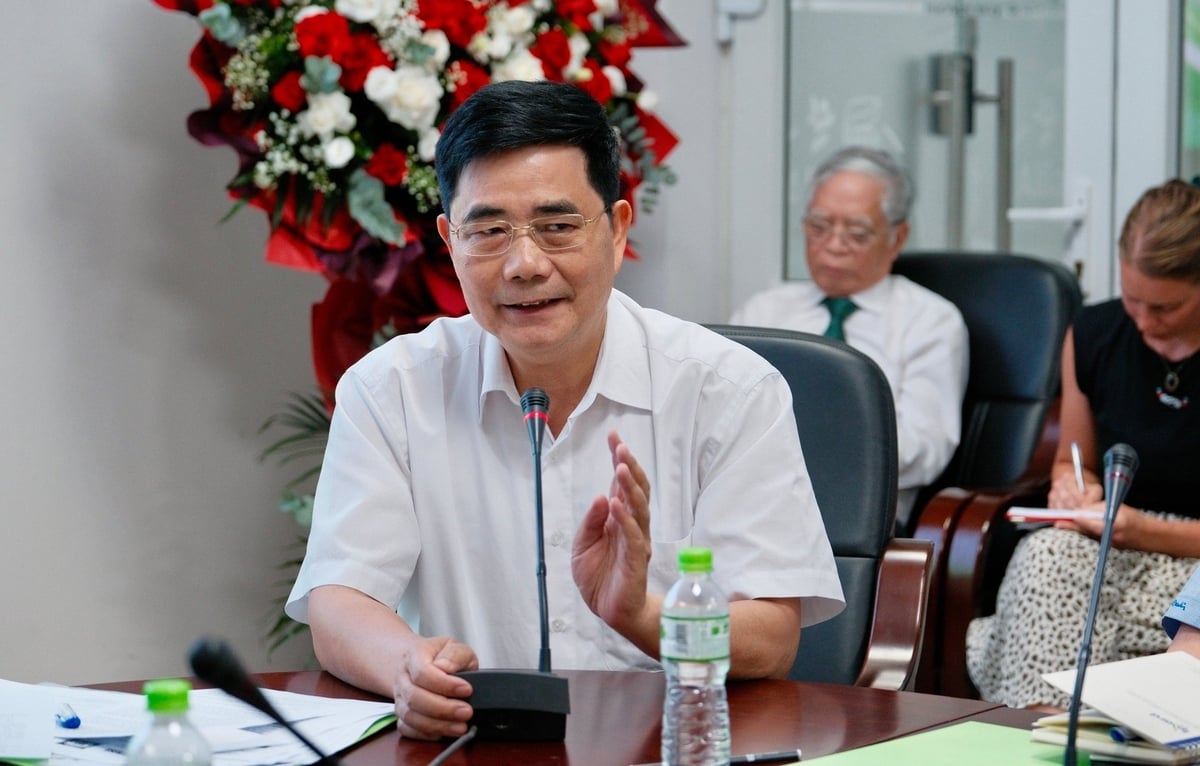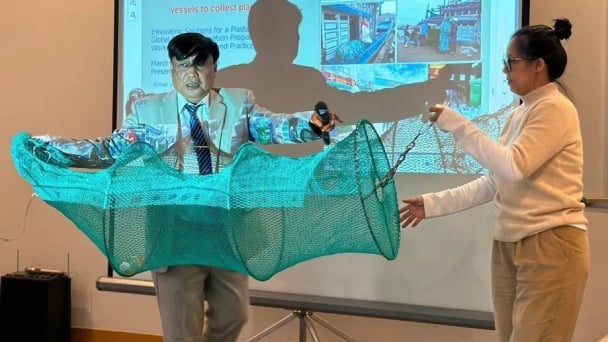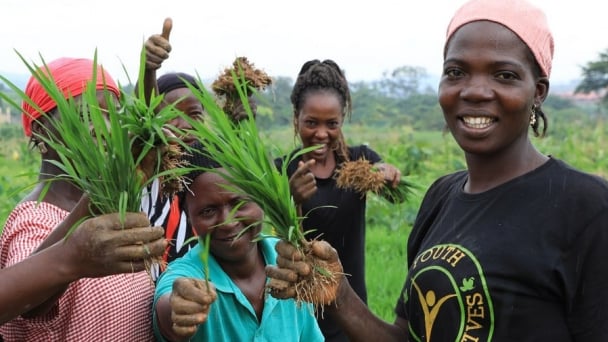May 14, 2025 | 11:55 GMT +7
May 14, 2025 | 11:55 GMT +7
Hotline: 0913.378.918
May 14, 2025 | 11:55 GMT +7
Hotline: 0913.378.918
On May 13, the International Rice Research Institute (IRRI), in collaboration with the Department of Crop Production and Plant Protection (Ministry of Agriculture and Environment), organized a workshop titled “Database for Rice Cultivation Management in the Mekong Delta in Support for the One Million Hectares High-Quality, Low-Emission Rice Program."
Leading national and international experts discussed how to utilize data derived from research and surveys on the current status of rice cultivation. These surveys were conducted on a scale of 10,000 smallholders across 12 provinces in the Mekong Delta region during the 2022-2024 period.

Dr. Nguyen Van Hung, senior scientist at IRRI, presented data on greenhouse gas emissions from rice production in the Mekong Delta. Photo: Quynh Chi.
Dr. Nguyen Van Hung, senior scientist and Lead of Mechanization and Post-harvest at IRRI Vietnam, shared: “The data collected from 10,000 farmers not only provides a comprehensive picture of the current state of rice cultivation but also serves as an important foundation for building recommendation models tailored to specific regions and seasons.”
Results gathered by the IRRI team revealed numerous correlations between various interventions such as mechanization, fertilizer management, straw collection, and intermittent flooding and drying practices.
For rice cultivation, the research team proposed several possibilities and scenarios for reducing emissions. The analyses showed that increasing straw incorporation period to over 30 days in Tra Vinh, straw removal in Dong Thap, or prevention of straw burning in Kien Giang yielded the highest emissions reduction outcomes.
However, this data still requires further analysis and cross-referencing with real-world production practices to assess each region's emission reduction potential. IRRI is expected to integrate these 10,000 data points into a compatible map for irrigation, straw collection, and other practices in the Mekong Delta region.
Some initial findings highlight factors such as behavior, crop management, production, economic efficiency, mechanization, fertilizer use efficiency, greenhouse gas emissions, and cost-benefit analysis.

It is expected that 10,000 data points will be integrated into a map compatible with low-emission farming practices for the Mekong Delta region. Photo: IRRI Vietnam.
Regarding fertilizer management, the majority of farmers apply chemical fertilizers more than four times per crop season, which is higher than the optimal recommended level. The excess use of nitrogen fertilizers reduces soil quality, leaches into water systems, and causes environmental pollution.
The survey indicated a correlation between seed use and nitrogen fertilizer use. The data shows that reducing seed density increases fertilizer efficiency. When plant density is low, scientists suggest that rice plants face less competition for nutrients.
Regarding fertilizer management, the majority of farmers apply chemical fertilizers more than four times per crop season, which is higher than the optimal recommended level. The excess use of nitrogen fertilizers reduces soil quality, leaches into water systems, and causes environmental pollution.
Additionally, the survey indicated a correlation between seed use and nitrogen fertilizer use. The data shows that reducing seed density increases fertilizer efficiency. When plant density is low, scientists suggest that rice plants face less competition for nutrients.
Experts identified factors affecting the efficiency of nitrogen fertilizer use, including the amount of seed sown, the number of fertilizer applications, and the duration of flooding before the crop season. In-depth analysis of fertilizer use efficiency and influencing factors serves as the basis for developing strategic solutions to reduce inputs and increase outputs in rice production.
From this, they proposed a management strategy and effective investment plan for the One Million Hectares High-Quality, Low-Emission Rice Program, building technical solutions that align with the current state of the value chain, including land, water, infrastructure, mechanization, services, and regional markets.

Chairman of the IRRI Member Council, Cao Duc Phat, praised the efforts and results of the research team. Photo: Quynh Chi.
Dr. Cao Duc Phat, Chair of the IRRI Board of Trustees and former Minister of Agriculture and Rural Development of Vietnam, was impressed by the survey conducted by local and international scientists. "It has probably been over 30 years since we have seen such an in-depth and large-scale census. This data is a ‘gold mine’ for research," Dr. Phat shared.
He also emphasized the importance of mobilizing resources to carry out similar efforts in other rice-growing regions of Vietnam. According to him, this dataset could help in policy development and smart production organization, and serve as a cornerstone for agricultural extension and rice science in general.
IRRI's Chair recommended that the survey team establish a data-sharing mechanism for research institutions both within and outside of Vietnam. This should be done promptly so that the data repository can effectively contribute to the sustainable transformation process in the Mekong Delta.
The workshop also featured the signing ceremony of a Memorandum of Understanding between Vietnam Rice Industry Association (VIETRISA), the Vietnam Soil Science Association (VSSA), and Vietnam Fertilizer Association. This event marked a strong commitment to collaboration between scientific organizations and business associations in promoting sustainable rice production in the Mekong Delta.
Translated by Kieu Chi

(VAN) FAO Director-General QU Dongyu marks International Day of Plant Health at NENA conference.

(VAN) Deputy Minister of Agriculture and Environment Hoang Trung affirmed that floriculture and ornamental plants are a growing industry that receives significant global attention.

(VAN) The three staple crops dominating modern diets – corn, rice and wheat – are familiar to Americans. However, fourth place is held by a dark horse: cassava.
/2025/05/10/4037-3-223011_495.jpg)
(VAN) Remote sensing technology is becoming an indispensable tool in monitoring resources, developing modern agriculture, and protecting the environment in Vietnam.

(VAN) The trash bag used on fishing vessels can withstand rough sea conditions, including level 8 to level 10 winds and waves. Notably, it can be hung anywhere on the boat.

(VAN) African leaders launched the Kampala Declaration on Building Resilient and Sustainable Agrifood Systems in Africa, marking a bold step toward transforming the continent's agriculture.